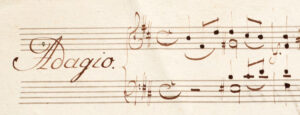Musical annotation is a language in its own right. Its words come from Italian, but the syntax is very different, and the meaning of the words often is too. I’m sure linguists have studied it in detail. I’m neither a linguist nor a professional musician, but I have a strong interest in both areas, so let me offer a few thoughts on the subject.
Since the nineteenth century, musical directions have come in other languages, usually the composer’s native language. I think Schumann was the first major composer to do it. For this piece, I’m just talking about annotations based on Italian.
 The annotations are usually adjectives with optional modifiers: Sforzando, Allegro con brio, Adagio molto, etc. Occasionally you’ll see verbs, verb phrases (“Volti subito”), and even full sentences. Beethoven’s Emperor Concerto has the unusually verbose direction “Non si fa una cadenza, ma s’attacca il sequente.”
The annotations are usually adjectives with optional modifiers: Sforzando, Allegro con brio, Adagio molto, etc. Occasionally you’ll see verbs, verb phrases (“Volti subito”), and even full sentences. Beethoven’s Emperor Concerto has the unusually verbose direction “Non si fa una cadenza, ma s’attacca il sequente.”
These words are Italian, but they don’t always have the same meaning as in normal Italian usage. “Andante” means “going” in Italian, but “somewhat slowly” in music-Italian. In proper Italian, “piu andante” would mean “more going,” which you might think means “faster,” but in a musical score it normally means “slower.” “Presto” means “instantly” or “right away” in Italian, but in music means “really fast.”
The way the words combine differs from Italian syntax. You can pile adjectives and phrases together: “Andante moderato,” “Allegro maestoso ma non troppo,” etc. The Kyrie of Beethoven’s C major Mass is marked “Andante con moto assai vivace quasi Allegretto ma non troppo,” which translates as something like “slow but moving along, rather quick, almost pretty quick, but not too quick.”
An italic “F” by itself means “forte” (loud), and “FF” is “fortissimo” (“loudest,” louder than forte). What’s “fff”? That’s called “fortississimo,” which is a double superlative and I don’t think is a legitimate Italian word. Tchaikovsky used “ppppp” in the Pathétique Symphony. What’s that? Pianississississimo? Should the audience hear it at all?
This offshoot of Italian exists because in the Renaissance, Italy dominated Europe musically. Not only were many prominent composers Italian, composers in other countries followed the Italian lead to enhance their prestige. Most early operas were in Italian, regardless of the composer’s nationality, and the trend continued through Mozart’s time. However, composers in other countries didn’t always understand the language very well. What started out as straightforward directions in Italian evolved into a language with its own syntax and definitions.